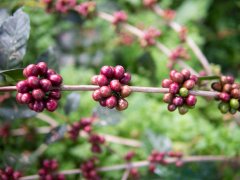El Salvador Coffee beans El Salvador Coffee producing areas introduce El Salvador Hot Spring Coffee

Professional coffee knowledge exchange more coffee bean information please follow the coffee workshop (Wechat official account cafe_style)
Active volcanic activity brings mineral-rich volcanic ash to the country. In the soil dominated by volcanic ash, there are more minerals and less organic matter. Therefore, in order to maintain the location and make up for the lack of organic matter, farmers in the country will use the pulp residue of treated coffee beans or organic matter under coffee trees as fertilizer to make up for the lack of organic matter in the soil. Make the planting of coffee trees more able to produce coffee beans with harmonious taste. The country's most meaningful initiative is to introduce organic agriculture to the world, cultivating more than 150000 tons of organic coffee every year.
The topography of El Salvador in El Salvador belongs to the highland topography and is the smallest country in Central America. Because there are two parallel mountains in the country, the volcanic soil is rich in minerals, and this special geographical environment makes El Salvador suitable for growing coffee.
Salvadoran coffee has five major producing areas (Apaneca, Central Belt, Chichontepec, Tecapa & Cacahuatique Mountain Range), mostly distributed in the volcanic ash-covered mountain slopes or plateau areas at an altitude of 1200 meters. October to February of the following year is the coffee harvest and harvest season. The coffee beans it produces belong to Arabica, mainly Bourbon bourbon and Pacas Pacas. It can be divided into three grades according to the altitude, namely SHG (Strictly High Grown), SG (High Grown) and SC (Central Standard).
Coffee farms are located in the hills and volcanic slopes where the soil is the most fertile. Because of its special planting soil, Salvadoran coffee has a unique flavor, mellow taste, moderate sweet and sour, rich aroma, and charming tonality. Coffee beans are large beans with sweet taste and excellent flavor. El Salvador is also an important producer of organic coffee.
It is worth mentioning that El Salvador produces a hot spring coffee, named because of the use of hot spring water for washing treatment, its special and supple sour taste and sweet smell is very charming, because the low yield makes the unit price quite high, is its very characteristic coffee.
Important Notice :
前街咖啡 FrontStreet Coffee has moved to new addredd:
FrontStreet Coffee Address: 315,Donghua East Road,GuangZhou
Tel:020 38364473
- Prev

Introduction to the brief history of Salvadoran coffee.
Professional coffee knowledge exchange more coffee bean information please follow the coffee workshop (Wechat official account cafe_style) A brief history of coffee in El Salvador: in the mid-19th century, El Salvador became independent from Nicaragua after the disintegration of the Union, and its cash crop was mainly locust blue, a crop used to make indigo dyes until the mid-19th century, when chemical dyes were invented.
- Next

90 + Coffee Ninety Plus Coffee
Then why write a special article about a raw bean company, 90yuan? (and the length is not short) 90 + coffee has become an indispensable topic in the boutique coffee circle in recent years. Beans that have not drunk 90 + should at least know what 90 + is popular. The focus of the topic is nothing more than the following two points: what is the new concept of 90 +? What kind of new beans has come out of 90+? From this, we can
Related
- Beginners will see the "Coffee pull flower" guide!
- What is the difference between ice blog purified milk and ordinary milk coffee?
- Why is the Philippines the largest producer of crops in Liberia?
- For coffee extraction, should the fine powder be retained?
- How does extracted espresso fill pressed powder? How much strength does it take to press the powder?
- How to make jasmine cold extract coffee? Is the jasmine + latte good?
- Will this little toy really make the coffee taste better? How does Lily Drip affect coffee extraction?
- Will the action of slapping the filter cup also affect coffee extraction?
- What's the difference between powder-to-water ratio and powder-to-liquid ratio?
- What is the Ethiopian local species? What does it have to do with Heirloom native species?

